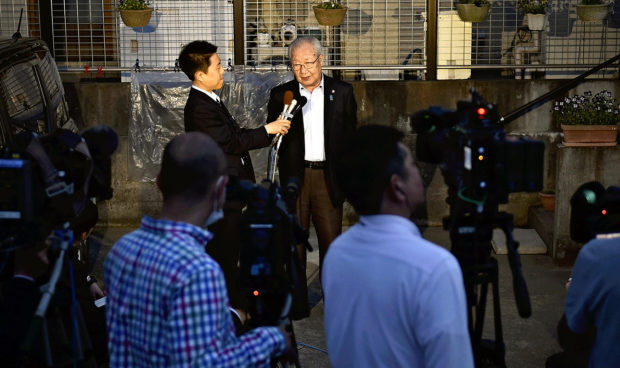
Shigeo Iizuka, right, representative of the Association of the Families of Victims Kidnapped by North Korea, speaks to reporters on Friday in Ageo, Saitama Prefecture. (The Yomiuri Shimbun)
TOKYO — The government plans to maintain its policy of pressuring North Korea despite expressing a degree of approval of the joint statement signed on Friday by South Korean President Moon Jae In and North Korean leader Kim Jong Un.
This is because the government does not regard the Panmunjom Declaration as a tangible step toward the complete abandonment of North Korea’s nuclear weapons and missiles.
The government also plans to promptly gather information from South Korea about why the declaration and the joint press conference by the two leaders failed to mention the issue of abductions of Japanese nationals by North Korea.
Foreign Minister Taro Kono released a statement on the day, saying the government welcomes the inter-Korean summit and joint declaration “as a positive development for the comprehensive resolution of outstanding issues of concern regarding North Korea.”
However, he went on to say that Japan “strongly hopes North Korea … takes concrete actions for the dismantlement of all weapons of mass destruction, including biological and chemical weapons, and ballistic missiles of all ranges in a complete, verifiable and irreversible manner.”
The government plans to keep a close eye on what action North Korea takes following the declaration. A senior Foreign Ministry official referred to the declaration, saying: “It fails to mention a concrete process for achieving [Pyongyang’s] abandonment of nuclear weapons and missiles. It is completely unclear whether [disarmament] can be achieved.”
The government is skeptical about the inter-Korean summit because it distrusts North Korea for previously continuing to develop nuclear weapons and missiles while holding talks with the international community.
At a House of Representatives Budget Committee session on Thursday, Prime Minister Shinzo Abe said: “Pyongyang used the 1994 US-North Korea Agreed Framework and the 2005 joint statement of the six-party talks as a pretext to buy time and push forward its nuclear and missile development programs.”
Abductees’ families disappointed
Family members of Japanese nationals abducted by North Korea expressed disappointment about Friday’s inter-Korean summit and instead shifted their hopes toward the US-North Korea summit scheduled to be held by early June.
It is unclear whether Moon and Kim discussed the abduction issue during the summit. Their joint statement made no mention of it.
Following the release of the Panmunjom Declaration, Takuya Yokota, a younger brother of Megumi Yokota — who was abducted in 1977 aged 13 — said the inter-Korea summit “focused on presenting a peaceful atmosphere.”
“It’s disappointing that the statement failed to discuss the abductions and other human rights issues [involving North Korea],” the 49-year-old added.
Takuya will visit the United States from Monday and meet with US government officials and others to appeal for cooperation in resolving the abduction issue. “The US-North Korea summit will be a critical juncture,” he said.
Shigeo Iizuka, 79, representative of the Association of Families of Victims Kidnapped by North Korea, said Friday’s summit was “filled with superficial remarks and actions, and lacked substance.”
“Kim may have inherited the false perception that the abduction issue has already been resolved,” said Iizuka, the older brother of Yaeko Taguchi, who was abducted in 1978 at 22.
“I hope [US President Donald Trump] obtains a definite promise during the US-North Korea summit to let the abductees return home, and makes it a springboard toward realizing a Japan-North Korea meeting,” he added.